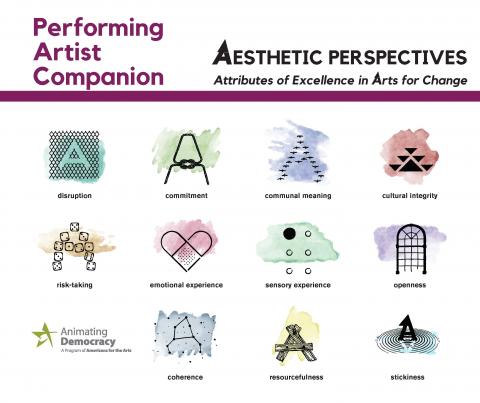The Performing Artist Companion to Animating Democracy’s framework, Aesthetic Perspectives: Attributes of Excellence in Arts for Change, offers ideas and insights to help performing artists and performance companies apply the framework to address their needs and interests. Aesthetic Perspectives aims to enhance understanding and evaluation of creative work at the intersection of arts and community/civic engagement, community development, and justice. It offers 11 artistic attributes that elevate aesthetics in civically and socially engaged art, expand the criteria for considering aesthetics, and promote appreciation of the rigor required for effective work.
Author Mark Valdez, theater artist and organizer and former director of the Network of Ensemble Theaters underscores the framework’s value in addressing the void of aesthetic vocabulary defined by artists to discuss the aesthetics of Arts for Change and an often shallow understanding of the ways that performing arts function toward civic and social change. The attributes substantiate that Arts for Change work is grounded in a rigorous aesthetic practice and philosophy that deserves to be viewed through an aesthetic prism.
Valdez outlines ways performing artists and companies can apply and adapt the framework in: sharpening how they describe work in artist statements, grant proposals, and reflective writing; planning and developing a new project to ensure due attention to aesthetic values and priorities in both process and product; creating a shared language with collaborators; and examining creative practices and defining indicators of artistic success to evaluate the work.
Aesthetic Perspectives was developed by artists and allied funders and evaluators who participated in the 2014-15 Evaluation Learning Lab (ELL) led by Animating Democracy, a program of Americans for the Arts, in partnership with the Nathan Cummings Foundation and the Arts x Culture x Social Justice Network. Framework dissemination and activation is supported by Hemera Foundation.


Most Commented